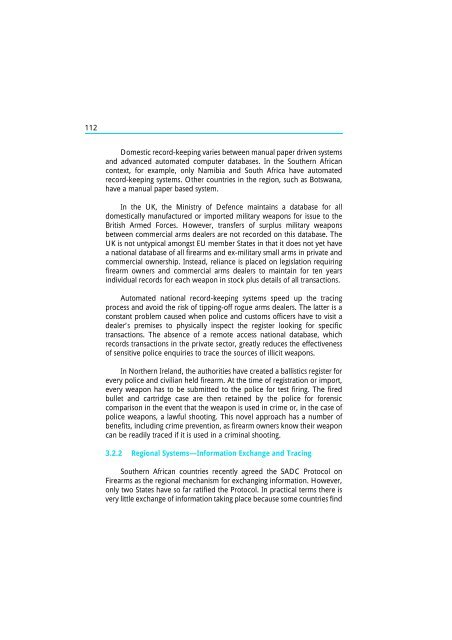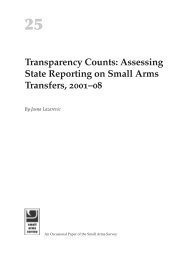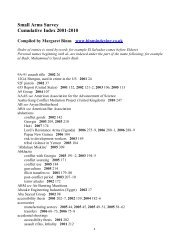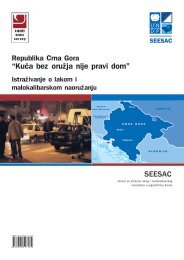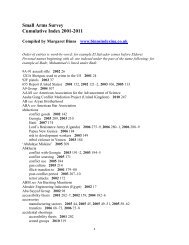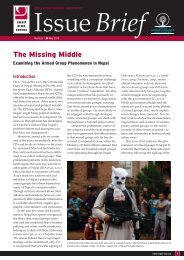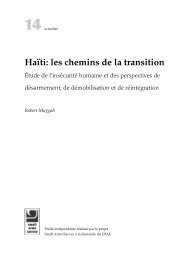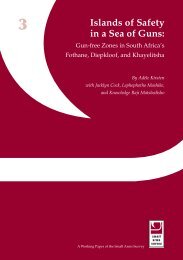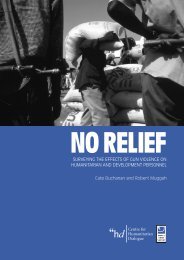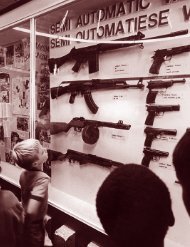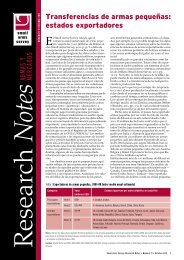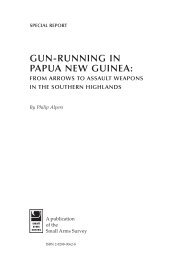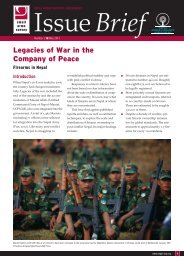The Scope and Implications of a Tracing Mechanism for Small Arms ...
The Scope and Implications of a Tracing Mechanism for Small Arms ...
The Scope and Implications of a Tracing Mechanism for Small Arms ...
You also want an ePaper? Increase the reach of your titles
YUMPU automatically turns print PDFs into web optimized ePapers that Google loves.
112<br />
Domestic record-keeping varies between manual paper driven systems<br />
<strong>and</strong> advanced automated computer databases. In the Southern African<br />
context, <strong>for</strong> example, only Namibia <strong>and</strong> South Africa have automated<br />
record-keeping systems. Other countries in the region, such as Botswana,<br />
have a manual paper based system.<br />
In the UK, the Ministry <strong>of</strong> Defence maintains a database <strong>for</strong> all<br />
domestically manufactured or imported military weapons <strong>for</strong> issue to the<br />
British Armed Forces. However, transfers <strong>of</strong> surplus military weapons<br />
between commercial arms dealers are not recorded on this database. <strong>The</strong><br />
UK is not untypical amongst EU member States in that it does not yet have<br />
a national database <strong>of</strong> all firearms <strong>and</strong> ex-military small arms in private <strong>and</strong><br />
commercial ownership. Instead, reliance is placed on legislation requiring<br />
firearm owners <strong>and</strong> commercial arms dealers to maintain <strong>for</strong> ten years<br />
individual records <strong>for</strong> each weapon in stock plus details <strong>of</strong> all transactions.<br />
Automated national record-keeping systems speed up the tracing<br />
process <strong>and</strong> avoid the risk <strong>of</strong> tipping-<strong>of</strong>f rogue arms dealers. <strong>The</strong> latter is a<br />
constant problem caused when police <strong>and</strong> customs <strong>of</strong>ficers have to visit a<br />
dealer’s premises to physically inspect the register looking <strong>for</strong> specific<br />
transactions. <strong>The</strong> absence <strong>of</strong> a remote access national database, which<br />
records transactions in the private sector, greatly reduces the effectiveness<br />
<strong>of</strong> sensitive police enquiries to trace the sources <strong>of</strong> illicit weapons.<br />
In Northern Irel<strong>and</strong>, the authorities have created a ballistics register <strong>for</strong><br />
every police <strong>and</strong> civilian held firearm. At the time <strong>of</strong> registration or import,<br />
every weapon has to be submitted to the police <strong>for</strong> test firing. <strong>The</strong> fired<br />
bullet <strong>and</strong> cartridge case are then retained by the police <strong>for</strong> <strong>for</strong>ensic<br />
comparison in the event that the weapon is used in crime or, in the case <strong>of</strong><br />
police weapons, a lawful shooting. This novel approach has a number <strong>of</strong><br />
benefits, including crime prevention, as firearm owners know their weapon<br />
can be readily traced if it is used in a criminal shooting.<br />
3.2.2 Regional Systems—In<strong>for</strong>mation Exchange <strong>and</strong> <strong>Tracing</strong><br />
Southern African countries recently agreed the SADC Protocol on<br />
Firearms as the regional mechanism <strong>for</strong> exchanging in<strong>for</strong>mation. However,<br />
only two States have so far ratified the Protocol. In practical terms there is<br />
very little exchange <strong>of</strong> in<strong>for</strong>mation taking place because some countries find


